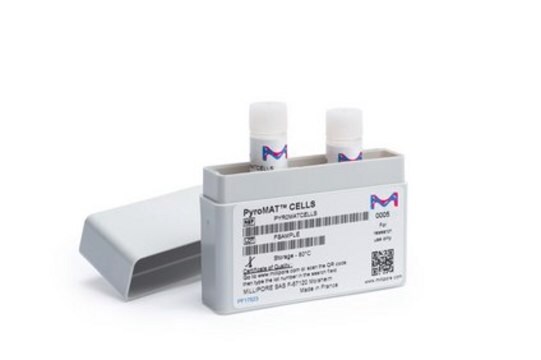408-05A
Human Fibroblast-Like Synoviocytes: HFLS, adult
Synonyme(s) :
HFLS cells
About This Item
Produits recommandés
Source biologique
human synovial tissues (normal)
Niveau de qualité
Conditionnement
pkg of 500,000 cells
Fabricant/nom de marque
Cell Applications, Inc
Mode de croissance
Adherent
Caryotype
2n = 46
Morphologie
Fibroblast-like
Technique(s)
cell culture | mammalian: suitable
Maladie(s) pertinente(s)
arthritis
Conditions d'expédition
dry ice
Température de stockage
−196°C
Description générale
Normal HFLS provide an excellent cellular model for studying the normal and pathological physiology of synoviocytes and development of joint diseases.
Normal HFLS have been used in numerous research studies to:
- Study changes in gene expression in synoviocytes stimulated with TNFα (Suggiyama, 2002)
- Demonstrate that TNF-like weak inducer of apoptosis (TWEAK) contributes to joint inflammation by inducing chemokines such as MIP-1β (CCL-4), lymphotactin (XCL-1), IFN-γ-inducible protein 10 (IP-10) (CXCL-10), MCP-1 (CCL-2), and RANTES (CCL-5), as well as the matrix metalloprotease-9, suggesting TWEAK as a new therapeutic target (Perper, 2006)
- Demonstrate the role of miR-124a in arthritis pathogenesis (Nakamachi, 2009)
- Show that C/EBPβ regulates expression of metalloproteinases and ADAMTS family members in synoviocytes stimulated with IL-1β (Tsushima, 2012); and that HMW-HA suppressed ADAMTS4 mRNA and protein expression via CD44, p38 MAPK and JNK pathways (Kataoka, 2013)
- Evaluate the anti-inflammatory and antirheumatic activity of various compounds, such as NF-κB inhibitors (Wen, 2006), AGIX-4207 (Kunsch, 2005), HA–methotrexate conjugates (Homma, 2009) and bucillamine (Oki, 2009)
- Show that reactive arthritis triggered by chlamydial infection is mediated by TLR2 induced IL-6 production in synoviocytes (Konomi, 2009); and investigate the mechanisms of arthritis-like syndrome in patients infected with chikungunya (CHIK) virus (Xu, 2013)
- Suggest that only leukocyte-poor, RBC-free platelet-rich plasma should be used in clinical orthopaedics because leukocytes and RBCs cause synoviocyte death and proinflammatory mediator production (Brown, 2014)
- Identify that cartilage link protein and MAGP2 can be used as specific markers to distinguish chondrocytes and synovial cells (Rapko, 2007, 2010)
- Create, along with human dermal fibroblasts, induced pluripotent stem cells (iPSC) by using the now classic “Yamanaka cocktail”, the discovery for which Dr. Shinya Yamanaka was awarded the Nobel Prize in 2012 (Takahashi, 2007)
Additionally, in parallel with HFLS isolated from joints of patients with rheumatoid arthritis, normal HFLS were used to:
- Identify causing agents (such as uric acid crystals or platelet microparticles) and study the immunopathological mechanisms and signal transduction pathways leading to joint inflammation in rheumatoid arthritis (Chen, 2011a; Hsu, 2012; Mathieu, 2008; Tsuji, 2012), and to demonstrate the role of estrogen signaling in increasing inflammation (Galal, 2008)
- Investigate anti-inflammatory properties of herbal compound Sinomenine suggested for rheumatoid arthritis treatment (Chen, 2011b)
- Study the effects of extracellular matrix composition on cell attachment and migration relevant to T-cell function in inflamed tissues (Evanko, 2012)
Finally, all three types of HFLS (normal, RA and OA) were used to investigate the role of human endogenous retroviruses (HERVs) in development of rheumatoid arthritis, and suggest that activated expression of different forms of HERV contribute to development of rheumatoid arthritis symptoms by different mechanisms (Freimanis, 2010).
Origine de la lignée cellulaire
Application
Composants
Notes préparatoires
- 2nd passage, >500,000 cells in Basal Medium containing 10% FBS & 10% DMSO
- Can be cultured at least 5 doublings
Procédure de repiquage
Clause de non-responsabilité
Code de la classe de stockage
11 - Combustible Solids
Classe de danger pour l'eau (WGK)
WGK 3
Point d'éclair (°F)
Not applicable
Point d'éclair (°C)
Not applicable
Certificats d'analyse (COA)
Recherchez un Certificats d'analyse (COA) en saisissant le numéro de lot du produit. Les numéros de lot figurent sur l'étiquette du produit après les mots "Lot" ou "Batch".
Déjà en possession de ce produit ?
Retrouvez la documentation relative aux produits que vous avez récemment achetés dans la Bibliothèque de documents.
Protocoles
Store the cryovials in a liquid nitrogen storage tank immediately upon arrival.
Notre équipe de scientifiques dispose d'une expérience dans tous les secteurs de la recherche, notamment en sciences de la vie, science des matériaux, synthèse chimique, chromatographie, analyse et dans de nombreux autres domaines..
Contacter notre Service technique


